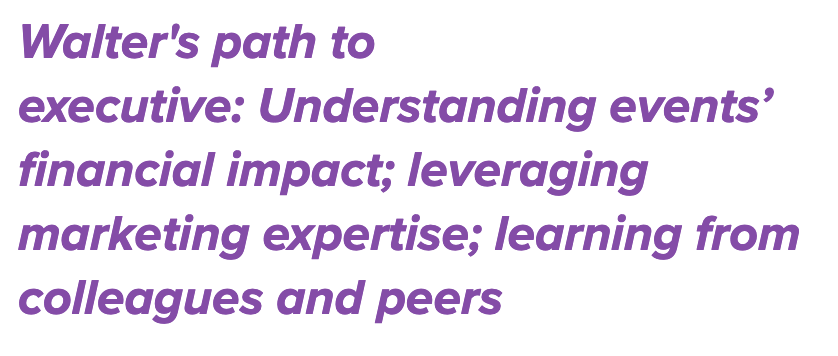While most people tend to “fall into” the meetings industry, Amy Walter knew coming out of college that business events were her calling.
After graduating with a degree in marketing, she spent four years in catering and convention services for a hotel and casino in Reno, Nev. However, “I always wanted to be the one influencing the strategy and the creative aspects of those events—focusing on the people they’re being built for and the impact they will have on a business,” she says.
As a result, Walter went to an agency as a marketing and event manager, with a mission to develop integrated campaigns tailored to specific audience segments and then measure each event’s return on investment over the following months.
But she knew that becoming a leader meant learning about every aspect of events that serve a company’s marketing channel. Once Walter landed at Atlassian, a developer of cloud-based software and collaboration tools, in September 2016, she took on a stretch assignment under the tutelage of the firm’s head of events and field marketing: building out a global event-portfolio strategy with an emphasis on audience acquisition, to maximize the impact those events had in each market.
under the tutelage of the firm’s head of events and field marketing: building out a global event-portfolio strategy with an emphasis on audience acquisition, to maximize the impact those events had in each market.
“The goal was to create high-touch opportunities for customer engagement and community building” that strengthens their confidence in the company, Walter says. “So, what does each customer type want to understand better from attending one of our events? To lead such a program, you must understand the effect that events have on connecting customers to the sales team and driving revenue.”
In addition, “you must make data-driven decisions on how much you should allocate for each program element,” she adds. “That relies on attendee surveys and feedback. What do your acquisition trends look like? Is the makeup of your audience changing? It’s critical to anticipate the needs of your audience as well as understand how the business’s goals are evolving so that your events can have greater impact. You must also have open dialogue and collaboration with stakeholders and executives. Being able to connect the dots across all those areas enhances your value to the organization and helps move your career forward.”
The Benefits of Mentors and Networks
In addition to Walter’s manager of seven-plus years guiding her whenever she was curious about different elements of events, Walter has also regularly tapped into the collective knowledge of the 500-plus members of the Corporate Event Marketing Association. In fact, the association has been important enough to her learning that she became a board member three years ago— and in January, began serving as CEMA’s chairwoman.
“I first went to a CEMA event about six years ago, and I was floored by the number of event leaders who are directors and vice presidents at technology, financial, and other companies,” Walter says. “I wanted to be in their position, and hearing the way they approach events from a portfolio-wide perspective really helped shape my thinking and got me to say, ‘I can do that too.’ If you’re not exposed to that level of thinking, it’s hard to understand all the pieces you need to get there.”
To move up, “it’s critical to recognize the gaps in your skill set and seek educational opportunities to fill those gaps,” she adds. “For me, a great deal of that has come from peer-to-peer connections, because events are one of the most fast-paced, highly evolving channels within a marketing organization. The perspectives of your peers can keep you ahead of the curve.”
As for becoming a leader in the events division of an organization, “there is so much opportunity for planners as the wider business world changes,” says Walter. For instance, “not long ago there wasn’t a role known as event technologist. But now that’s a vital position on almost every event team; digital strategy is an absolute necessity.”
Overall, “continuously pushing yourself to grow by connecting with others who have similar responsibilities, plus next-level responsibilities, is just so important.”
More Executive Profiles
• The Path to Executive: Japan as a Proving Ground
• The Path to Executive: Understanding People and Possibilities
• The Path to Executive: Working with an Outcomes Mindset
Related
• New Report: Women’s Career Advancement





